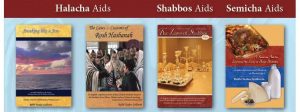Miscellaneous Q&A relating to Tu Beshvat Fruits
What blessing is one to say on Esrog jelly?[1]
Borei Peri Haeitz.[2]
Is the blessing of Shehechiyanu to be recited upon eating Esrog jelly?[3]
No.[4]
Is the blessing of Shehechiyanu to be recited upon eating Carob?
Some Poskim[5] rule that the blessing of Shehechiyanu is not to be recited over carob.[6] However, the Rebbe is reported to have answered Rabbi Chadakov that in Russia the blessing of Shehechiyanu was customarily recited over carob.[7]
_____________________________________________________[1] Orchos Chaim 202:9 in name of Minchas Pitim; Piskeiy Teshuvos 202:13 footnote 67; Luach of Rav Prus; Luach of Seder Birchas Hanehnin in English; Luach of Rav Elyashvili in Seder Birchas Hanehnin
[2] The raw peel of an Esrog which is edible receives the blessing of Shehakol prior to consumption. [See Admur 202:9; Seder 6:4 and 15; Ketzos Hashulchan 51:7 footnote 7] If the peel was turned into marmalade or a chocolate covered treat then its blessing is Haeitz. [Orchos Chaim 202:9 in name of Minchas Pitim Piskeiy Teshuvos 202:13 footnote 67; Luach of Rav Prus; Luach of Seder Birchas Hanehnin in English; Luach of Rav Elyashvili in Seder Birchas Hanehnin]
The reason: Esrog peels that are in jam or candy or chocolate are Haeitz as a) they are cultivated for their peel, and b) the peel is the main part of the fruit. [Poskim ibid based on Ran Shabbos 108; See Admur 202:9; Seder 6:4 and 15 that the only reason a peel is degraded from its blessing is because it is not the main part of the fruit, and hence by an Esrog, since it is the main part of the fruit its blessing is Haeitz.]
[3] Siddur Yaavetz Seder Birchas Hanehnin 25; Ashel Avraham Butchach 225; Leket Yosher p. 149; Halef Lecha Shlomo 92; Kesav Sofer 23; Mahariy Ashkenazi 9; Halachos Ketanos 2:257; Shaar Efraim 35; Beir Heiytiv 225:11; M”B 225:16; See Kaf Hachaim 225:43; Devar Yehoshua 2:33; Poskim in Piskeiy Teshuvos 225:17 footnote 124
[4] The reason: As the fruit is not fit to be eaten in its raw state and must be first cooked. [Siddur Yaavetz and Ashel Avraham ibid] Alternatively, the reason is because one already said Shehechiyanu over it on Sukkos. [Mahariy Ashkenazi ibid and Poskim ibid] Alternatively, the reason is because it does not have any season and is on the tree throughout the year. [Shaar Efraim ibid; Poskim ibid]
[5] Piskeiy Teshuvos 225:17 footnote 123 based on Kitzur SHU”A 59:17
[6] The reason: As we do not bless Shehechiyanu on foods that do not contain Simcha. [Kitzur SHU”A 59:17]
[7] From the diary of Rabbi C.M.I. Hodakov, dated the eve of the 15th of Shevat, 5718, Brooklyn, NY: “I asked the Rebbe if Shehecheyanu should be made on Bokser (carob), and the Rebbe answered that in Russia they would make the Brocho Shehecheyanu on carob. Also, when I commented that it is available year-round, the Rebbe responded that on Rosh Hashanah we also say Shehecheyanu on fruits that are commonly available, and there’s no reason to suspect that they are last year’s produce.”; Vetzaruch Iyun, as the Alter Rebbe writes in Seder Birchas Hanehnin 6:1 that since carobs do not commonly grow in Russia, therefore he avoided going into their laws.



Leave A Comment?
You must be logged in to post a comment.